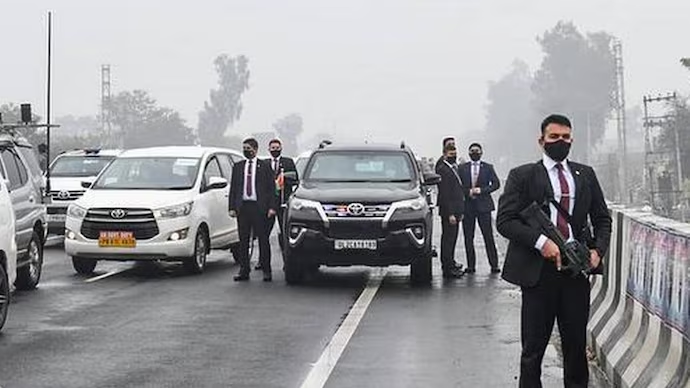
In a significant development regarding the security lapse during Prime Minister Narendra Modi’s visit to Punjab on January 5, 2022, the Supreme Court of India has refused to entertain a request by the Punjab Government to access the statements of witnesses recorded in the Justice Indu Malhotra Committee’s confidential report. This report was commissioned to investigate the incident, which left the Prime Minister’s convoy stranded on a flyover in the state, amidst protests.
The Supreme Court, in its ruling on November 22, 2024, dismissed the Punjab Government’s plea, stating that the state could conduct its own enquiry into the security lapse without the aid of the confidential witness statements. A Bench of the Supreme Court, headed by Justice Surya Kant, found no grounds to entertain the request, emphasizing that the state could take necessary actions against the officials involved based on its own findings.
Background of the Security Lapse Incident
On January 5, 2022, Prime Minister Modi’s convoy was delayed for nearly 15-20 minutes on a flyover in Ferozepur, Punjab, due to a blockade by protesting farmers. This incident sparked a national controversy and raised concerns about the security protocols meant to protect high-profile individuals like the Prime Minister. The convoy was forced to turn back without attending several scheduled events, including a rally in the region.
In the aftermath of the incident, the Supreme Court of India formed the Justice Indu Malhotra Committee to probe the causes behind the breach, identify those responsible, and suggest corrective measures for future security arrangements. The committee’s report indicated serious lapses in security protocols and highlighted failures by state officials tasked with ensuring the Prime Minister’s safety during his visit.
Punjab Government’s Request and the Court’s Ruling
The Punjab Government sought access to the statements of witnesses recorded in the Justice Malhotra Committee’s confidential report, hoping it would assist in actions against “delinquent” officials. Specifically, they were focused on taking action against those who failed to prevent the security breach, particularly in relation to the Ferozepur SSP (Senior Superintendent of Police), whose negligence had allegedly led to the situation.
However, the Supreme Court dismissed this plea, stating that the State of Punjab could proceed with its investigation without the confidential documents. The Bench led by Justice Surya Kant observed, “The State of Punjab may conduct the enquiry against delinquent officials without the aid of the statements of the witnesses… We find no grounds for entertaining the plea.”
Details from the Confidential Report
The confidential findings of the Justice Indu Malhotra Committee were first revealed by the then Chief Justice of India N.V. Ramana in August 2022. After reviewing the report, he stated that Ferozepur’s SSP had been found negligent in performing his duties, particularly in relation to maintaining law and order during the Prime Minister’s visit.
In his oral remarks shared in open court, Chief Justice Ramana noted that the SSP had failed to ensure law and order, despite having sufficient personnel and prior information about the Prime Minister’s route. He also noted that the SSP had been alerted two hours in advance about the convoy’s passage through the area.
The Committee was tasked with investigating the causes behind the security breach, identifying those responsible, and recommending measures to prevent such incidents in the future. The terms of reference also included suggestions for improving security protocols for the Prime Minister and other constitutional functionaries.
Implications of the Court’s Decision
The Supreme Court’s decision underscores the importance of maintaining confidentiality in sensitive investigations, particularly those involving high-profile individuals such as the Prime Minister. By refusing the request of the Punjab Government, the Court has emphasized that state agencies can take necessary actions based on the available evidence, without compromising the integrity of the investigation or the confidentiality of witness testimonies.
At the same time, the ruling has raised questions about the limitations on access to sensitive documents in high-profile cases and the balance between transparency and legal process. While the Punjab Government is expected to continue its own investigation, the decision may influence future inquiries into security lapses involving public figures and constitutional authorities.
Next Steps for Punjab Government
Following the Supreme Court’s ruling, the Punjab Government is likely to proceed with its own internal inquiry and disciplinary action against officials who were deemed responsible for the security breach. However, without access to the witness statements, the state will need to rely on other available evidence, including the committee’s findings and any additional records from law enforcement agencies.
The case highlights the tension between state governments and national authorities when it comes to matters of high security and governance. While the Punjab Government has sought transparency and accountability, the Supreme Court’s stance signals that such sensitive issues must be handled with caution and in accordance with legal protocols.


